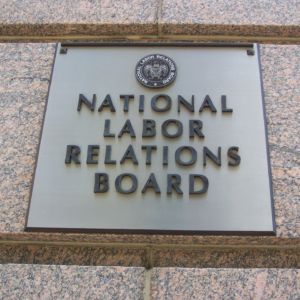The federal agency tasked with resolving labor dispute cases announced its intention Wednesday to undo a controversial policy implemented during the last administration.
The National Labor Relations Board (NLRB) is responsible for enforcing federal labor law and resolving unfair labor practice complaints. President Donald Trump recently gained a majority on the five-member board with his last nominee being confirmed April 11. Now the new board is looking to undo an update to the joint-employer standard.
Former President Barack Obama was in office when the labor board updated the standard. It is used to determine whether an employer is legally responsible for the employees of a company it contracts with. Critics contested the update created unnecessary confusion and legal risk for businesses that contract together.
“Whether one business is the joint employer of another business’s employees is one of the most critical issues in labor law today,” NLRB Chairman John Ring said in a statement. “The current uncertainty over the standard to be applied in determining joint-employer status under the Act undermines employers’ willingness to create jobs and expand business opportunities.”
The NLRB is considering rulemaking to address the standard for determining joint-employer status under the National Labor Relations Act. It was already started the internal process necessary to consider rulemaking. Any rule will still need majority approval from the board once it is proposed.
“In my view, notice-and-comment rulemaking offers the best vehicle to fully consider all views on what the standard ought to be,” Ring said. “I am committed to working with my colleagues to issue a proposed rule as soon as possible, and I look forward to hearing from all interested parties on this important issue that affects millions of Americans in virtually every sector of the economy.”
The joint-employer standard was previously determined based on whether a company has direct control over the employment policies of another business. The updated standard is instead determined based on indirect control which critics have denounced as a vague overreach of federal powers.
“For American businesses and workers, today’s move by the National Labor Relations Board to address regulatory uncertainty associated with the joint-employer standard is welcome news,” Competitive Enterprise Institute labor policy expert Trey Kovacs told InsideSources. “The NLRB’s announcement of a new joint employer rulemaking is a better, less politicized way than adjudication to deal with labor policies that impact businesses and jobs across the nation.”
The Obama-era NLRB was able to update the standard when ruling in a 2015 case involving Browning-Ferris Industries. The new board majority has struggled to reverse the change with its own ruling because of a possible conflict of interest involving board member William Emanuel.
Congressional Republicans have also attempted to roll back the updated standard as well. The Save Local Business Act was proposed to clarify the law so future administrations make such drastic changes in how it is interpreted. It is also written to fix an even greater underlying problem which has allowed for a patchwork of legal interpretations.
The House was able to pass its version of the bill November 2017 – but it has since stalled in the Senate. Senate labor committee chairman Sen. Lamar Alexander noted that the bill was not likely to advance anytime soon during a policy conference Tuesday hosted by the International Franchise Association (IFA).
“The ongoing uncertainty created in 2015 by the NLRB’s radical expansion of the joint employer standard continues to present significant challenges for franchisors and franchisees,” Matt Haller, the senior vice president of government relations and public affairs at the IFA, said in a statement provided to InsideSources. “Today’s announcement is an acknowledgement the Trump administration recognizes the importance of providing clear rules for employers on joint employer in the long term.”
Those in support of the updated standard have argued that it was a needed change that prevented employers from sidestepping their employment responsibilities. They believe large companies have been using contracting relationships to separate themselves from workers who should be considered their employees.
The NLRB also adds that the inclusion of the proposal in the regulatory agenda does not reflect the participation of board members Pearce and McFerran. The two of them are holdovers from the Obama administrations since members serve staggered five years terms.

